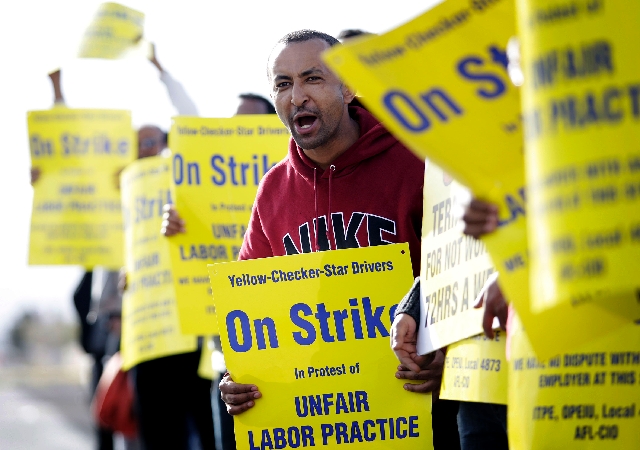Las Vegas cab strike causing few ripples; drivers seek better wages


Charles Young said he was fighting for a “livable wage” Sunday as more than 1,000 drivers participated in the first cabby strike in the Las Vegas Valley in nearly two decades .
About 250 Yellow Checker Star Transportation drivers protested Sunday afternoon in front of the business in the southwest valley.
Young, 54, who has more than two years of experience with the company , the second-largest in Las Vegas, said he works 12-hour shifts and 60 hours per week. He said he’s lucky when his two-week paycheck reads $600.
“It’s brutal,” Young said across the street from the company at 5225 W. Post Road, near Decatur Boulevard and Sunset Road . “They are robbing us blind.”
Most of the company’s drivers went on strike starting at 12:01 a.m. Sunday. But the first day’s impact on the state’s tourism industry had been minimal , as some resorts on the Strip and McCarran International Airport reported business as usual, despite fewer cabbies shuttling people around.
Yellow Checker Star union drivers are represented by the Industrial Technical Professional Employees Union Local 4873. Yellow Checker Star holds 600 operating permits, known as medallions, for one-fourth of a citywide taxi fleet. According to the union, the company has about 1,700 drivers, about 400 of whom are not union members.
The striking cabbies held up signs demanding a fair contract. They chanted “shame on you” as drivers pulled in and out of the Yellow Checker Star’s lot.
Bill Shranko, Yellow Checker Star’s chief operating officer, was steadfast that his company on Feb. 3 approved terms of conditions for employees and there would be no compromises, despite the strike.
The company unilaterally implemented work conditions rejected by 70 percent of union members in January. Drivers have worked and been paid under its terms since then.
“It’s their move,” Shranko said of the striking cabbies. “We love our drivers. We don’t want Las Vegas to get a black eye. … We want them to get back to work.”
Shranko said under the Feb. 3 terms of working conditions Yellow Checker Star drivers received a 22 percent increase in their annual bonus and an increase in their safety bonus, a bonus drivers receive for not getting into accidents.
Shranko said unlike most cab companies, Yellow Checker Star drivers don’t have to pay to fuel up their vehicles.
“They are being a bit unreasonable,” Shranko said of the striking cabbies.
The Nevada Taxicab Authority directors have given administrator Charles Harvey authority to issue as many as 30 medallions to each of the other 13 cab brands to help cover any shortfall in service.
As of Sunday night, Harvey said the authority had not issued any medallions and were waiting until today to see the full effect of the strike’s first day.
The strike will be monitored closely, Harvey said. “We are concerned whether it lasts one day or multiple days.”
The strike had no apparent effect at MGM Resorts International’s 10 major resorts on the Strip, company spokeswoman Yvette Monet said.
The strike also had no effect at McCarran International Airport, one of the nation’s busiest airports, spokesman Chris Jones said.
“There’s going to be lines for taxis, but that’s a normal thing, strike or no strike,” he said. “We haven’t seen anything that suggests something beyond the usual.”
The strike comes during one of the city’s busiest times, with fans taking in four major college basketball tournaments in the next two weeks and bettors flocking to sports books during March Madness. In 2012, March topped all other months in tourism, with 3.5 million visitors .
Paul Bohelski, chief negotiator for the union representing drivers, said the main sticking points were pay and working conditions. He said drivers haven’t received a pay raise since 2008.
He added Yellow Checker Star reported $102.5 million in gross earnings in 2012, which didn’t include credit card fees and advertising revenue.
He said cabbies wanted to avert the strike, but they won’t “accept something that is shoved down their throats,” Bohelski said, referring to the working conditions the company approved in February.
How Yellow Checker Star fared its first day with striking workers depends upon whom you ask.
Union workers said between noon and 4 p.m. Sunday, the company should have had 315 vehicles on the road, but only 118 left the lot.
Still, Shranko said two-thirds of the vehicles that typically go out on a day shift made it to valley roads.
“We were satisfied,” Shranko said.
Several striking cabbies said the main issues between them and their employer were: higher wages, pushing quotas on drivers for the amount of money they take in per shift and requirements on the number of hours worked.
“It’s a public safety issue,” said Binyam Semereab, 52, who noted that Yellow Checker Star requires cabbies to work at least 60 hours per week unless they have six or more years with the company. “They (drivers) are working 60 to 70 hours. Some could fall asleep on the job.”
Another driver, Andom Kahsay, 31, said his company encourages drivers to meet quotas on the amount of money taken in per shift. Kahsay said drivers are encouraged to take longer routes, known as “long-hauling.”
Drivers “ want to treat our customers fairly,” Kahsay said.
Several drivers said a cabby who works 60 hours per week or more typically makes about $600. In addition, tips taken in during that time average about $150, drivers said.
Shranko declined to comment on the cabbies’ complaints.
Neither Shranko nor the drivers were encouraged the strike might end soon. A typical refrain from cabbies Sunday was: “As long as it takes.”
The Associated Press contributed to this report. Contact reporter Antonio Planas at aplanas@reviewjournal.com or 702-383-4638.












